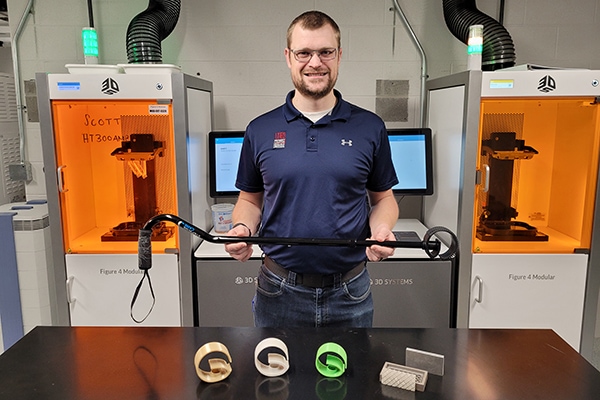The University of Dayton Research Institute is advancing additive manufacturing technologies to help the Air Force more affordably sustain its fleet, and it also was the perfect solution to help one physical therapist help people walk more safely.
John Moore watched a lot of television while recovering from donating a kidney to his mother. The New Jersey-based doctor of physical therapy said he was inundated with commercials about a type of walking cane that purported to help users walk more easily. But Moore wasn’t convinced. So he decided to develop a better one.
In December, Moore brought StepWise™ to market. Its unique round tip, closely resembling a lower-case “e,” is distinctly different than any of the single-, tri- or quad-tipped canes currently on the market, he said. It’s also safer to use, he added.
Using plastic purchased on the internet, a propane torch and a piece of old running shoe sole, Moore crafted a crude model of the cane tip he’d imagined. Then he came to UDRI.
Working with additive manufacturing engineer Michael Pratt in UDRI’s structural materials division, Moore was able to bring a final prototype to a manufacturer in a fraction of the time it would have taken had he worked with a company that uses traditional prototyping processes, such as tool and die casting, injection molding or machining, he said.
“Additive manufacturing, also known as 3D printing, involves engineering a design using computer software and then printing the part, layer by layer, using the appropriate medium—in this case a polymer resin,” Pratt said. “It allows us to quickly make digital design changes and print new prototypes in less time, more affordably and without the material waste involved in traditional manufacturing.”
Pratt worked with colleague Rebecca Hoffman, a mechanical engineer in UDRI’s applied mechanics division, who used modeling and simulation software to provide design and materials analysis on each iteration. The researchers worked together through a series of prototypes in pursuit of the perfect balance of design and material strength, flexibility and light weight.
Moore said that balance was critical to meeting his two priorities in a new cane: safety and comfort.
“The round tip allows for a rolling pivot, which matches the way a person’s foot works when they walk,” he said. “When you put a flat-tipped cane in front of you to step toward it, the tip does not sit flat on the ground, so very little of the tip surface makes contact with the floor. But our round, semi-rigid tip provides more surface contact for safety and allows for a rolling gait. It basically eliminates the potential to use it incorrectly.”
The round tip also features a 1-inch gap that closes when weight is applied to the cane. That bit of resistance as the gap closes, along with a deep rubberized tread designed to dispel water on wet surfaces, absorbs some of the compressive force that’s normally transferred to the user, Moore said. “That reduces the force that normally impacts the user’s joints, which is especially important for people who have issues with arthritis or carpal tunnel syndrome.”
Moore said he looked into using 3D manufacturing to develop a new tip because the design had to be created from scratch; there was nothing at all like it in the marketplace.
Pratt said he enjoyed working on the project because of its novelty, adding that it took only a handful of iterations until a final prototype and design specs were ready to hand off to a manufacturer for mass production.
“Mike was great to work with,” Moore said. “I’d still be trying to get this cane to market if not for UDRI.”
Subscribe to AM Chronicle Newsletter to stay connected: https://bit.ly/3fBZ1mP
Follow us on LinkedIn: https://bit.ly/3IjhrFq
Visit for more interesting content on additive manufacturing: https://amchronicle.com


